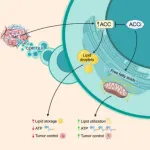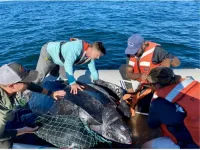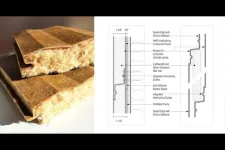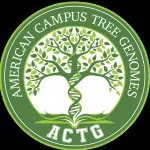(Press-News.org) CHAPEL HILL, N.C. – T cells are often called “assassins” or “killers” because they can orchestrate and carry out missions to hunt down bacteria, viruses, and cancer cells throughout the body. Mighty as they may be, recent research has shown that once T cells infiltrate the environment of a solid tumor, they lose the energy needed to combat the cancer.
A research team led by Jessica Thaxton, PhD, MsCR, associate professor of cell biology and physiology and co-leader of the Cancer Cell Biology Program at the UNC Lineberger Comprehensive Cancer Center, aimed to understand why T cells do not sustain energy in tumors. Using their expertise in tumor immunity and metabolism, the Thaxton Lab, led by the Katie Hurst, MPH, and 4th year graduate student Ellie Hunt, found that a metabolic enzyme called Acetyl-CoA Carboxylase (ACC) causes T cells to store fat rather than burning fat for energy.
“Our discovery fills a long-standing gap in knowledge regarding why T cells in solid tumors don't appropriately generate energy,” said Thaxton. “We inhibited the expression of ACC in mouse cancer models, and we observed that T cells were able to persist much better in solid tumors.”
The new findings and immunotherapeutic strategies, which were published in Cell Metabolism, could be used to make multiple types of T-cell therapies more effective for patients, possibly encompassing both checkpoint and chimeric antigen receptor (CAR) T-cell therapies.
In the field of cancer immunotherapy, it has long been known that T cells are not able to create their cellular energy, called adenosine triphosphate or ATP, when they are inside of a solid tumor.
In 2019, Thaxton’s lab studied a T cell with optimal antitumor function. In a publication in Cancer Immunology Research, Hurst and Thaxton used a proteomics screen to identify enzymes associated with the optimal antitumor metabolism of these T cells. Through this screen, the two discovered that ACC expression may limit the ability of T cells to make ATP in tumors. ACC, a key molecule that is involved in many metabolic pathways, blocks cells from breaking down fat and using it as fuel for energy in mitochondria.
“Acetyl-CoA carboxylase can drive the balance between storing lipids versus breaking down those lipids and feeding them into the citric acid cycle for energy,” said Thaxton. “If ACC is flipped ‘on’, cells generally store lipid. If ACC is ‘off’, cells tend to use the lipid in their mitochondria to make ATP.”
Using Hunt’s expertise in confocal imaging, the research team was able to observe lipid stores in T cells isolated from multiple types of cancers. The observation, as well as other experiments, confirmed the team’s hypothesis that T cells were storing lipids instead of breaking them down.
Thaxton’s team then used CRISPR Cas9-mediated gene deletion to see what would happen if they “deleted” ACC from the picture. There was a rapid reduction in the amount of lipid storage in T cells, and the team was able to visualize fat relocating to the mitochondria to be used to generate energy.
Thaxton now hypothesizes that T cells may need a “delicate balance” of lipids to persist in solid tumors with a certain amount of lipid dedicated to cancer cell assassination and low levels of fats being maintained in stores.
The latest findings could prove to be useful in enhancing chimeric antigen receptor (CAR) T-cell therapies. This cutting-edge technology takes T cells out of cancer patients, modifies them in the lab to hunt down tumor cells, and then re-infuses the cells to fight the patient's cancer. Preliminary data from Thaxton's lab demonstrates that even the manufactured T cells contain excess lipid stores.
The lab is starting to look in patient samples to understand how researchers can possibly flip the ACC metabolic switch directly in patient tumors, negating the need to take out and reinfuse cells back into the body. But researchers must first determine how this could affect other immune cell populations in the body, such as macrophages.
About UNC School of Medicine
The UNC School of Medicine (SOM) is the state’s largest medical school, graduating more than 180 new physicians each year. It is consistently ranked among the top medical schools in the US, including 5th overall for primary care by US News & World Report, and 6th for research among public universities. More than half of the school’s 1,700 faculty members served as principal investigators on active research awards in 2021. Two UNC SOM faculty members have earned Nobel Prize awards.
# # # #
END
MIAMI, FLORIDA (March 15, 2024) – The public health toll from bereavement is well-documented in the medical literature, with bereaved persons at greater risk for many adverse outcomes, including mental health challenges, decreased quality of life, health care neglect, cancer, heart disease, suicide, and death. Now, in a paper published in The Lancet Public Health, researchers sound a clarion call for greater investment, at both the community and institutional level, in establishing support for grief-related suffering.
The authors emphasized that increased mortality worldwide caused by the COVID-19 pandemic, suicide, drug overdose, homicide, ...
The Damon Runyon Cancer Research Foundation has named 14 new Damon Runyon Fellows, exceptional postdoctoral scientists conducting basic and translational cancer research in the laboratories of leading senior investigators. The prestigious, four-year Fellowship encourages the nation's most promising young scientists to pursue careers in cancer research by providing them with independent funding ($300,000 total) to investigate cancer causes, mechanisms, therapies, and prevention.
The Foundation has also named six recipients of the Damon Runyon-Dale F. Frey Award for Breakthrough Scientists. This award recognizes Damon Runyon Fellows who have exceeded the Foundation’s ...
A new study led by a team of marine scientists at the University of Miami Rosenstiel School of Marine, Atmospheric and Earth Science and the National Oceanic and Atmospheric Administration Southeast Fisheries Science Center, provides groundbreaking findings that offer insights on the migration and foraging patterns of leatherback sea turtles along the Northwest Atlantic shelf.
Scientists have known that leatherbacks commonly swim from the South and Mid-Atlantic Bights during the warmer months to reach feeding areas near New England and Nova Scotia, Canada where food is plentiful. ...
The presentation summarised the preliminary findings from patients with known or suspected endometriosis who were imaged with a SPECT-CT camera and subsequently underwent planned laparoscopic surgery, a key-hole surgical procedure to establish the presence, absence and location of endometriotic lesions. The imaging findings were compared to the surgical and histology reports and indicate that 99mTc-maraciclatide holds potential as a non-invasive test for early-stage endometriosis.
Specifically these preliminary findings demonstrate that 99mTc-maraciclatide has the potential to:
Visualise superficial peritoneal endometriosis which is found ...
(Boston)—The MYCN oncoprotein (proteins related to the growth of cancer cells) plays a key role in starting, advancing and making it difficult to treat various human cancers. When MYCN is overactive, especially in high-risk neuroblastoma (childhood cancer often found in the adrenal glands), the tumors become less responsive to immunotherapy—a treatment that uses the body's immune system to fight cancer. Still, recognition of this problem has not led to any effective strategies to tackle this problem.
In a new study from Boston University Chobanian & Avedisian School of Medicine, researchers found that MYCN selectively increases ...
Philadelphia, March 15, 2024 – Researchers from Children’s Hospital of Philadelphia (CHOP) identified a key metabolite in cells that helps direct immune responses and explains at a single cell level why immune cells that most efficiently recognize pathogens, vaccines, or diseased cells grow and divide faster than other cells. The findings also indicate that a better understanding of this metabolite and its role in immune response could improve the design of immunotherapies and create longer-lived responses against different types of cancer as well as enhance vaccine strategies. The findings were published ...
Weill Cornell Medicine investigators discovered that unique bacteria colonize the gut shortly after birth and make the neurotransmitter serotonin to educate gut immune cells. This prevents allergic reactions to food and the bacteria themselves during early development.
The preclinical study, published in Science Immunology on Mar. 15, showed that bacteria abundant in the guts of newborns produce serotonin, which promotes the development of immune cells called T-regulatory cells or Tregs. These cells suppress inappropriate immune ...
People who identify as lesbian, gay and bisexual – particularly women – respond more positively to tobacco marketing, are more inclined to smoke cigarettes daily and may have a more difficult time quitting, according to two studies by a Rutgers Health researcher.
The studies, published in the Annals of LGBTQ Public and Population Health and Preventive Medicine Reports, investigated how some among the LGBTQ population respond to tobacco marketing, how they use tobacco and their history of quitting using two large national datasets, including the Population Assessment of Tobacco and ...
Researchers from Rensselaer Polytechnic Institute (RPI) will use hemp to develop a commercially viable, durable, and low-embodied-carbon insulated siding product to address what the U.S. Green Building Council says is a “crucial need for building retrofits to improve energy efficiency and reduce carbon emissions.”
The three-year, $1.5 million award given as part of the Buildings Energy Efficiency Frontiers and Innovation Technologies (BENEFIT) funding opportunity from the United States Department of Energy (DOE) will support RPI faculty and industry partners in creating Hemp Retrofit Structural Insulated Panel (HeRS), a hemp-based insulated siding system that ...
Pears are big business in the Pacific Northwest US. But did you know that traditional pear breeding has remained largely unchanged for centuries? This slow process is difficult and costly, requiring the long-term commitment of labor, materials, and land-space resources. However, traditional pear breeding might get some help from genomics, thanks to a unique collaboration between students, scientists, and the pear industry fostered through an initiative called the American Campus Tree Genomes (ACTG).
ACTG was born from two professors’ ...





